Operations | Monitoring | ITSM | DevOps | Cloud
Latest News
DevOps vs. SRE: What's the Difference?
On-Call Schedules - Best Practices in 2022 (With Examples)
Service Catalog: Simplifying Service Management and Ownership
Exploring PagerDuty Alternatives for Incident Response
Incident response refers to effectively responding to infrastructure issues and resolving them in the shortest time frame possible. Due to several loss-inducing high-profile outages over the last few years, organizations have sought to create rigorous processes with specialized tools to resolve incidents quickly and learn from their failures. As one of the first platforms to enter the incident response space, PagerDuty is a dominant player, but over the years, competing platforms have begun carving out their own niche in the incident response space.
The Importance of Observability for Site Reliability Engineers (SREs)
Site reliability engineers (SREs) play a crucial role in ensuring the reliability of systems. From creating software to improving system reliability in production, responding to incidents, and fixing issues, SREs are responsible for guaranteeing the health of applications.. And observability helps support SREs'. Because an observable system allows them to identify and fix issues promptly, resulting in SRE's being better equipped to fast-track development cycles.
Tips to make your Retrospectives Meaningful
What DevOps, SRE and CloudOps teams can learn from CEOs
What can IT teams learn from today’s most successful CEOs? And, perhaps more interestingly, how can IT pros think like a CEO to level up teams across DevOps, SRE and CloudOps? Find out here.











